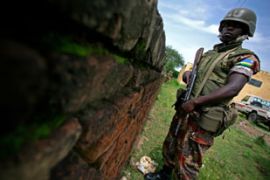UN chief in Sudan to tackle Darfur
Ban Ki-moon to discuss deployment of peacekeeping force to troubled region.

Lasting peace
 |
| Ban arrived in Khartoum on Monday to jump- start the Darfur peace process [AFP] |
“This is not a trip about breakthroughs,” one senior official said.
Abdelmahmood Abdalhaleem Mohamed, Sudan’s ambassador to the UN, said on the eve of Ban’s visit that “the secretary-general will find a committed Sudan, committed leadership, committed people to peace”.
Better or worse?
| In video |
|
|
However, a prominent Sudanese opposition leader has told Al Jazeera that the situation in the region is getting worse every day.
“Fighting has become a way of life,” Hassan al-Turabi, leader of the Popular Congress Party, said.
“Not only between the government and its Janjiwid allies, and the resistance movements, but now between the resistance movements who have spread into the land of other tribes.”
Despite this, al-Turabi said that the deployment of the joint UN-AU peacekeeping force is not necessary.
He said: “We advised the government … you don’t need African forces, you don’t need European forces, we don’t need them … to die for us.”
European contribution
On the other hand, Ban, in an interview with the Italian newspaper La Repubblica on Monday, said Western nations including Italy needed to provide specialist troops for the peacekeeping force.
| “The secretary-general will find a committed Sudan, committed leadership, committed people to peace” Abdelmahmood Abdalhaleem Mohamed, Sudan’s UN Ambassador |
The peacekeeping forces will replace the 7,000-strong African Union force now in Darfur by December 31.
Ban has described the mission as “one of the largest and most complex field operations the United Nations has ever undertaken” because of the harsh environment and lack of water and communications.
International experts estimate that about 200,000 have died and 2.5 million have been driven from their homes during four and a half years of fighting in Darfur.
Although Darfur will be the main focus of Ban’s trip, he will also visit south Sudan, where a 2005 peace deal to end a 20-year war that killed two million people appears to be faltering.
In neighbouring Chad, which has been affected by the spillover of the Darfur conflict, Ban said he will discuss the expected deployment of up to 3,000 European Union troops and 300 UN international police to help protect some 400,000 refugees and internally displaced people.
